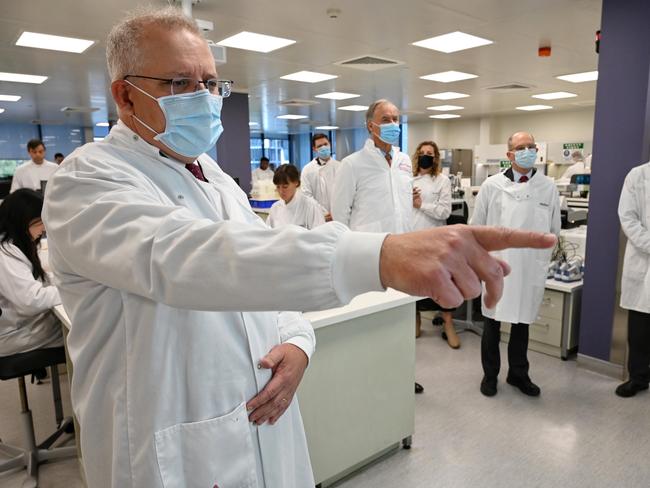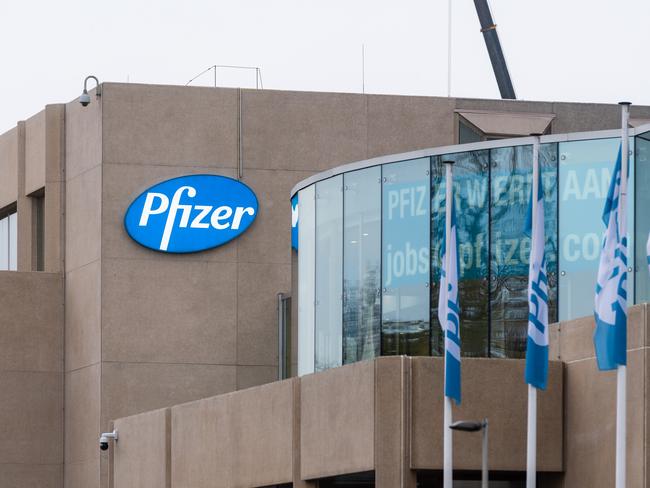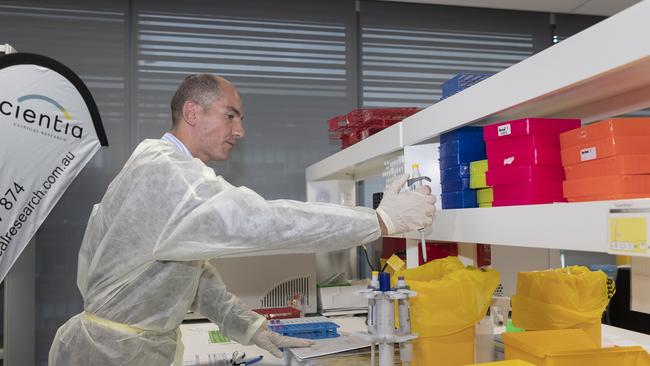Health Minister Greg Hunt announces COVID vaccine will be ready to roll out from March next year
Health Minister Greg Hunt has announced a date for the delivery of Pfizer’s breakthrough coronavirus vaccine in Australia.

Health
Don't miss out on the headlines from Health. Followed categories will be added to My News.
Health Minister Greg Hunt has announced Pfizer’s groundbreaking COVID vaccine will be rolled out in Australia from March.
“I’m delighted to announce that the government has secured as part of its agreement with Pfizer, full cold chain logistics, distribution for the Pfizer vaccine.
It’s what you call an mRNA vaccine, we have 10m units of that, part of a 134.8m unit, four-vaccine strategy … We have secured that for Australia, well ahead of expectations and on schedule, to deliver vaccines to Australians, commencing in March 2021,” he said.
“That is I think extremely important news. While, again, the advice is today that we may well have another zero community transmission case day for Australia, they are still waiting on two jurisdictions, we nevertheless have to be aware that we will not be out of this until we have a nation which has had a full vaccination program.”
The Therapeutic Goods Administration has given the AstraZeneca and Pfizer vaccines the green light after “very promising” data from early clinical trial phases.
This puts both developers on track for approval in January and for Australians to be vaccinated against COVID-19 from March 2021.

“It essentially expedites the process and brings critical medicines, or vaccines, at a faster rate then would otherwise be the case but with an absolute premium on safety,” Mr Hunt said.
The Therapeutic Goods Administration is expected to receive more clinical information needed to approve the vaccines around December.
The news comes as the Morrison government confirmed it would be able to distribute Pfizer’s world-first messenger ribonucleic acid (mRNA) type vaccine, which needs to be kept at minus 70C.
Very “sophisticated eskies”, which require dry ice that lasts for 14 days, would be used to hold and transport the vaccines, Therapeutic Goods Administration deputy secretary John Skerritt said.
“(The eskies) can be refilled twice without the need to connect to electricity,” Professor Skerritt said.
“These eskies with the two refills gives you a month-and-a-half of cold chain protection.”
The distribution process that goes to the National Cabinet on Friday includes giving vaccines to hospitals, respiratory clinics and general practices.
Professor Skerritt said the eskies would speed up the rollout of the vaccines because they allowed for multiple distribution points.
However, he said the jabs would not be approved until experts were confident they met the requirements of efficacy and safety.
SHORTAGE THAT COULD DELAY DELIVERY
A shortage of dry ice and restrictions on how much can be carried on flights are threatening to delay the rollout of Pfizer’s vaccine.
As scientists continue to work on delivering a lifesaving vaccine, new hurdles have emerged.
And there are calls for mink farming to be immediately banned after a vaccine-resistant mutant strain of coronavirus jumped from animals to humans in Denmark.
There were already shortages of dry ice in the United States this year, and the increased demand for the millions of doses of the Pfizer vaccine were expected to stretch supply.
The Pfizer vaccine, which is based on groundbreaking mNRA technology, needs to be stored at -70 degrees, with the world now scrambling to organise the logistics of a rollout.
But most airlines limit the amount of dry ice, which is the solid form of carbon dioxide, that can be carried to a maximum of 1000kg.

The dry ice can revert to gas when stored at aircraft temperatures, which has the potential to cause an explosion in the cargo hold.
Too much carbon dioxide in the cabin of the aircraft also risked creating breathing problems for crew.
Neel Jones Shah, head of airfreight for Flexport, told the UK Telegraph that under existing dry ice rules, aircraft would only be able to carry 17,000 vaccine doses.
Freight airlines were likely to seek permission from manufacturers including Boeing to ease the dry ice restrictions.
It comes as Britain’s health secretary Matt Hancock warned that there was a danger that coronavirus spreading among farmed mink in Denmark would threaten the vaccine rollout.
Denmark has ordered the culling of 15 million mink, which are bred to be used in fur coats, mainly in China.
There have been 12 coronavirus cases in Denmark linked to the new strain, which was potentially vaccine resistant, which was reported on November 5.
Six countries – Denmark, the Netherlands, Spain, Sweden, Italy and the US – have reported SARS-CoV-2 in farmed minks, according to the World Organisation for Animal Health (OIE).
Mr Hancock said an immediate worldwide ban on mink farming was needed.
“I think there is an international case on public health grounds for addressing this question of mink farming, which we banned in the UK two decades ago,” he said.
“It was due to come to an end in Europe in 2023 anyway but people will have their own views on animal welfare grounds and I have certainly got mine.
“But clearly on global public health grounds, there is a case to do everything we can to stop the retransmission of this virus into an animal population and then back again which can lead to these sorts of mutations that we have seen.”
Australia has purchased 10 million doses of the Pfizer vaccine, some of which was being produced in Belgium.
It was expected that the doses would be available in Australia early next year, with aged care and health staff likely to be the first recipients.
stephen.drill@news.co.uk
HOW AUSSIES COULD SKIP VACCINE QUEUE
Australians could avoid waiting for a COVID-19 vaccine by purchasing any successful treatment directly from pharmaceutical companies.
The Australian reports that while the Federal Government has signed four purchase agreements and will distribute a safe and effective vaccine freely, the frontrunning Pfizer-BioNtech candidate will only cover five million people.
In order to skip the queue, people could go straight to pharmaceutical companies — who are able to make any approved treatment privately available — to purchase a vaccine.
A spokesman for the federal Health Department told The Australian: “Decisions to make any vaccine available privately are for the sponsoring company, noting all vaccines need to be registered by the Therapeutic Goods Administration before they can be supplied in Australia.
“The Australian government is committed to providing COVID-19 vaccines at no cost to patients. The government does not intend to on-sell to private providers within Australia”.
Only Pfizer and AstraZenca have commenced steps to have their potential COVID-19 vaccines registered by the Therapeutic Goods Administration.
A Pfizer spokesperson told The Australian that “decisions on further access have not been made”, when asked about private supply.
There has been much speculation as to when a vaccine will be made available, with Prime Minister Scott Morrison on Tuesday saying he was “hopeful” and “optimistic” a successful candidate would be rolled out next year.
But the US’ top infectious diseases expert, Dr Anthony Fauci, went one step when detailing a timeline, saying Americans could begin receiving a COVID-19 vaccine within “the first four months” of 2021.
PARTICIPANTS OF TRIAL REVEAL AFTER-EFFECTS
The first volunteers to get the Pfizer coronavirus vaccine have said they felt like they had a “severe hangover” after the injection.
According to The Sun, some of the 43,500 people to get the trial vaccination have compared its side effects to those of the flu vaccine, including headaches and sore muscles.
Trial volunteer Glenn Deshields, 44, from Austin, Texas, compared the side effects to “a severe hangover” but said symptoms quickly cleared-up.
Another volunteer, 45-year-old Carrie from Missouri, said she experienced a headache, fever and body aches, after her first shot in September.
The side effects – which she compared to those from the flu jab – were worse after having her second dose last month, she said.
As the trial is double blind, the participants do not know if they are receiving the vaccine or a placebo.
Mr Deshields said he believed he was administered the actual vaccine after suffering hangover-like symptoms after his injection.
He scheduled an antibody test through his doctor and it came back positive, so he was confident he had not received the placebo.
THE AUSSIES WHO WILL GET PFIZER’S COVID-19 VACCINE
The first batch of Pfizer’s successful COVID-19 vaccine will reach just a fifth of the Australian population, starting with frontline health workers and the elderly.
These five million Australians will receive two doses of the drug — using all ten million rations the government has secured — and we can’t manufacture more doses here.
The roll out of the vaccine, in the first three to six months of 2021, will also be difficult because it has to be kept at an extremely low temperature – minus 70 degrees – to remain stable.
There should be just enough doses for the 609,000 practising frontline health workers including doctors, nurses, dentists, pharmacists, 3.8 million people aged over 65 and 250,000 aged care workers.
Prime Minister Scott Morrison said the Pfizer trial results were “very promising and I’m optimistic and hopeful next year about the rollout of those vaccine programs”.
Like much of the world, Australia’s sharemarket responded positively to the vaccine news on Tuesday.
The key S&P/ASX 200 index closed 42 points higher at 6341, a 0.7 per cent rise for the day, after surging 2.2 per cent in morning trade.
Health Minister Greg Hunt told News Corp Pfizer had committed to providing the cold chain delivery equipment to distribute the vaccine in Australia.
Experts warn the vaccine won’t mean the end of social distancing, handwashing and mask wearing until almost every Australian has received it.
CSIRO’s Director of biosecurity Dr Rob Grenfell said while the vaccine would prevent people getting sick but it would not “prevent you getting colonised by the virus”.
To eliminate the virus entirely, vaccines would have to be developed to stop the virus in the nasal cavity. The Pfizer vaccine does not do this.

Successful trials by Australia’s Doherty Institute of delivering the Oxford AstraZeneca vaccine into the noses of ferrets have led to a human trial of this method in the UK.
“If that develops an immunity at the surface of the nasal cells and it’s demonstrated to have nasal sterility, which is really the endpoint you’re looking for, that would then go a long way towards decreasing the spread of the virus,” Dr Grenfell said.
Conventional vaccines use a weakened form of the virus to prompt an immune response but mRNA vaccines like the one made by Pfizer use the virus’s genetic code to make a person’s own cells produce vaccine antigens and generate immunity.
This new age vaccine technology has never been used in humans before.
Nucleus Network’s Paul Griffin has trialled a number of mRNA flu vaccines in humans with no serious side effects.
“It’s not gene therapy, it is not able to be incorporated into the host genome so there’s absolutely no prospect of altering human DNA using the vaccine,” he said.
While Australia’s vaccine manufacturer CSL is producing two other COVID-19 vaccine candidates it does not have the equipment needed to make Pfizer’s mRNA vaccine and we will be dependent on receiving our supply of the vaccine from overseas manufacturers.
Mr Hunt told News Corp the government was considering over the longer term setting up an advanced pharmaceutical manufacturing plant in Australia that could produce this new type of vaccine.

While pharmaceutical giant Pfizer and BioNTech announced clinical trials of their COVID-19 vaccine were 90 per cent effective, the study was yet to be published or peer reviewed.
Pfizer said it would produce 50 million doses of its vaccine by the end of the year and 1.3 billion doses in 2021 but this would be enough to vaccinate less than one per cent of the world’s population.
There are over 200 vaccines in development and more than 40 are in clinical trials with several key trials due to report this month.
The Australian Government has deals to buy a total of 134 million vaccine doses made by Oxford AstraZeneca, University of Queensland, Novavax and Pfizer.
The Australian sharemarket rise was more subdued than offshore markets where key share indices in the US, Britain and Europe soared between 3 and 7 per cent.
Among local stocks were some big movers, with Corporate Travel Management climbing 16 per cent and Flight Centre adding more than 8 per cent.
Investment platform eToro’s market analyst, Adam Vettese, said the vaccine news had “injected optimism into travel stocks in particular”.
“However, while this is obviously a positive step forward there is still a way to go,” he said.
JBS Financial Strategists CEO Jenny Brown said markets were forward-looking and buyers were betting on a return to international travel.
“There’s a lot of positivity but it has pulled back a bit,” she said.
- with Anthony Keane and staff writers
MORE NEWS
Pfizer COVID-19 vaccine explained: How it will affect you
Apple’s world-first change revealed
